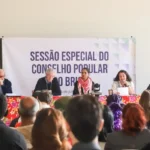
It was one of the PP’s strategic keys in the face of the momentous elections in Galicia on February 18: not to nationalize the campaign. Alfonso Rueda called the elections in the middle of carnivals and separated from the Basques to try to ensure that the messages were clearly autonomous. But at the key moment, a week before the votes begin to fill the polls, Alberto Núñez Feijóo, who was supposed to help him secure the absolute majority, has nationalized the campaign. And in the worst possible way for the interests of the PP.
At an event in Sarria (Lugo) last Saturday, the PP leader recalled his contacts with Junts after the July 23 elections to explore their support, direct or indirect, for Feijóo’s investiture. According to his story, Carles Puigdemont’s people demanded amnesty and the PP studied it “for 24 hours.” But not only. Feijóo also proposed a very conditional pardon as a possible horizon as a formula for “reconciliation” in Catalonia.
Two ideas confirmed by different PP sources consulted by elDiario.es, which ratify a third: the conviction that it will be “difficult” to convict the former president of the Generalitat for terrorism, despite the insistence of Judge Manuel García-Castellón and the Board of Prosecutors of the Supreme Court.
The surprising revelation was preceded by a thinly veiled threat from Puigdemont himself, who pointed the finger directly at Feijóo. “Everything will be known,” he wrote.
This same Sunday, after different media, including elDiario.es, published their respective information about what happened the previous days, Feijóo confirmed what he had said in a statement to journalists in Ferrol (A Coruña): “I said no, I said no and I still say no, to any amnesty for two reasons. The first: because it is illegal, unconstitutional and because it breaks the principle of equality of all Spaniards. I said and say no to any type of pardon because not a single one of the conditions for any possible pardon is met.”
The revelations of Feijóo and the PP leadership clash with their own archives of recent months and above all with the demonstrations called against Sánchez for negotiating with the independence movement.
To the rescue of Rueda
In this context, the key moment of the Galician election campaign has arrived, where a lot is at stake for the PP, but even more so for Feijóo himself. The leader of the PP responded to the call of his successor at the head of the Xunta. Rueda’s knowledge rates are modest, but in rural areas of Galicia they are very low. And they are key in the distribution of seats. Although the candidate has walked alongside his leader for two decades (first, in the PP; then, in the autonomous government), strong leaders always have the problem that they eclipse those who orbit around them. Even in 2024, changes in the capital are slowly reaching the villages.

And Rueda, plenipotentiary vice president for years, has not managed to overcome this handicap since in 2022 he received control of the Xunta and the Galician PP by direct appointment. Feijóo, who left for Madrid with the conviction that his destiny was to throw Pedro Sánchez out of the Moncloa Palace, continues to be better known among Galicians.
The national leader of the PP moves among his countrymen with the ease of someone who has spent 20 years traveling his land from corner to corner. Unlike how politicians normally act in Madrid, he, Feijóo, also takes off his complexes when he greets shopkeepers and customers at the Mercado de Abastos de Lugo, or at a temporary market in a random small town in Ourense.
People recognize him, stop him, hug him, smile at him. He tells him about his problems, or that a cousin, a brother or an acquaintance studied with him, worked alongside him or ran into him one day in Coruña. Feijóo listens and responds to everyone. He knows (or pretends that he knows) what they are talking to him about. If a woman tells him that she cried for him, “moito”, because of his failure in Madrid, he replies: “But don’t chores!”
This is the effect that the PP seeks with Feijóo’s absolute involvement in the campaign. The former president empathizes with some of his neighbors as he has not been able to do in Madrid. And there are many Galicians who continue to see her as his president. On Friday afternoon in Lalín (Pontevedra), some clueless person might have thought that Rueda was a local leader and Feijóo the candidate.
Both have coincided at specific moments. And perhaps they won’t do it again until the end of the campaign, next Friday.
Closing lines and signaling to the media
The two PP caravans were in those until the threat from Puigdemont arrived. The words about amnesty. And the feared “national event” that could dynamite the campaign in the last week.
After the televised debate and the polls of the first days of the race, the PP set its target on Ana Pontón. The candidate of the Galician Nationalist Bloc (BNG) has revealed herself as the only alternative to Rueda. Her polls place her well above the PSOE in voting intention, but she has also emerged as the reference for political change in the community.
Pontón is not new, as Feijóo and Rueda insist on pointing out whenever they can. The attacks, which range from the personal to the political, have increased in intensity the more it became clear that Pontón is the enemy to defeat, the person who can achieve the shift to the left 20 years later.
“I don’t want a president who believes that the model is that of Bildu, ERC, Junts and the PNV,” said Feijóo this Saturday in Viveiro (Lugo) on the shores of the Cantabrian Sea. And the leader of the PP has tested the Basque and Catalan right to even support him in some laws. For example, the “anti-squatting” rule that is being processed in the Senate, and in which both parties abstained. His participation will be key in his passage through Congress.
“The Block never stopped being the Block, and the PP never stopped being Galicia,” he said. “The Block is an element of confrontation. “He wants the financing model of Euskadi, even if 1,000 million are lost,” he assured.

At the same event, Feijóo briefly spoke again about the amnesty. “Amnesty does not fit in the Constitution, it is not possible. “We will not do it, we will not facilitate it in any case.” And he attacked Pedro Sánchez: “The amnesty is for them to make you president, boy. It’s the price you pay to be made president after losing the election. The rest are stories.”
Hours later, Feijóo’s reflections on the amnesty and pardons were published in fifteen media outlets, as well as the ratification made by PP sources in this regard. Three headlines: Feijóo came to value the amnesty after those contacts with Junts (although the management says that it ruled it out within 24 hours as illegal); The PP is willing to endorse a pardon for Puigdemont as long as he returns to Spain, is tried and rejects the unilateral route; and above all, the popular ones do not believe that the former president can be convicted of terrorism. All of this was published in 15 media outlets with different editorial lines.
What came next complies with the manual of an electoral campaign: closing ranks and pointing out an external enemy.
In this case, the media. Second-level leaders of the PP such as Rafael Hernando or Ana Blanco did so expressly on social networks. Also official accounts such as that of the PP of Andalusia. Many messages replicated Feijóo’s statements in Ferrol, as if they denied what was published, something that is not true.
It is very sad to see how @Santi_ABASCAL has become the main agent of dissemination of the hoaxes of the Sanchismo media Brunete. The useful fool
They will do everything possible to ensure that the PP does not obtain an absolute majority in Galicia even if another pro-independence government is implemented🤮
— Rafael Hernando (@Rafa_Hernando) February 11, 2024
And who are the main beneficiaries? The Government (the PSOE) and Vox. The first, because it allows them to defend themselves from attacks for negotiating the amnesty and introduces an element of debate that can allow them to emerge after a first week of little effectiveness in the electoral campaign.
At a rally in A Coruña, the former president of the Government José Luis Rodríguez Zapatero cried out against the double game of the PP. “It’s not that I didn’t want to, it’s that I couldn’t,” he said about the amnesty that Feijóo studied and that he did not carry out, in his opinion, because he was never going to have the support of Vox. Almost at the same time, the leader of the extreme right ratified this point. He accused Feijóo of being willing to amnesty “one of the worst crimes committed by public representatives in all of democracy.” “They studied the amnesty law for 24 hours; “It wouldn’t have lasted us a second,” he said this Sunday after calling Feijóo a “scam.” “The Spanish are fed up with lies and betrayals! “Puigdemont to prison and illegalization of separatist parties NOW!” they pointed out on their networks. An idea, by the way, that the PP flirted with at the beginning of the year and that it has already buried.
The leader of Vox, Santiago Abascal, thus took advantage of the situation to intensify the strategy of attacks on the PP in recent weeks, despite the fact that those from Feijóo have asked him to withdraw from Galicia given the difficulties they have in achieving representation.
In the PP of Galicia they do not believe that “the 2%” that Vox will achieve (according to their polls and which would prevent it from entering the Galician Parliament, where the barrier is 5% per province) will penalize the PP. But it is true that 23J did happen, and that a few thousand votes from Vox to the PP in some specific provinces would have allowed Feijóo to govern.
Rueda’s team maintained on Friday night that they have a floor of 39 seats (the majority is at 38), with many options of achieving 40, and that the outside vote will have little impact.
But the amnesty has emerged in the last week of the campaign in which some polls indicate a downward trend for the popular party. For now, the waters are contained in the PP. Nobody is going to go out in public to say what they think, although there is no shortage of stunned reactions. The entire game, everyone, is aware of what is at stake on Sunday, February 18. Later, it will be seen.
Source: www.eldiario.es

